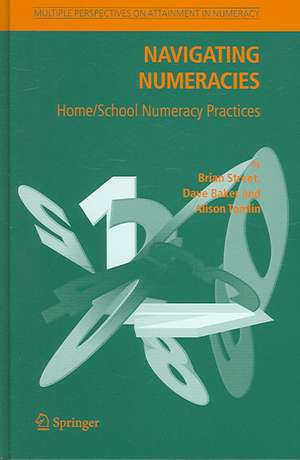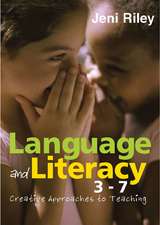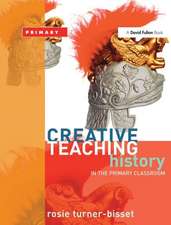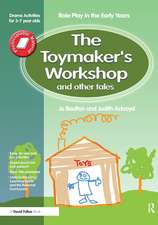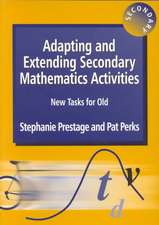Navigating Numeracies: Home/School Numeracy Practices
Autor Brian V. Street, Dave Baker, Alison Tomlinen Limba Engleză Hardback – 22 noi 2005
| Toate formatele și edițiile | Preț | Express |
|---|---|---|
| Paperback (1) | 385.47 lei 6-8 săpt. | |
| SPRINGER NETHERLANDS – 27 aug 2008 | 385.47 lei 6-8 săpt. | |
| Hardback (1) | 643.34 lei 6-8 săpt. | |
| SPRINGER NETHERLANDS – 22 noi 2005 | 643.34 lei 6-8 săpt. |
Preț: 643.34 lei
Preț vechi: 756.86 lei
-15% Nou
Puncte Express: 965
Preț estimativ în valută:
123.10€ • 128.87$ • 101.86£
123.10€ • 128.87$ • 101.86£
Carte tipărită la comandă
Livrare economică 05-19 aprilie
Preluare comenzi: 021 569.72.76
Specificații
ISBN-13: 9781402036767
ISBN-10: 1402036760
Pagini: 218
Ilustrații: XXVI, 218 p.
Dimensiuni: 155 x 235 x 18 mm
Greutate: 0.5 kg
Ediția:2005
Editura: SPRINGER NETHERLANDS
Colecția Springer
Locul publicării:Dordrecht, Netherlands
ISBN-10: 1402036760
Pagini: 218
Ilustrații: XXVI, 218 p.
Dimensiuni: 155 x 235 x 18 mm
Greutate: 0.5 kg
Ediția:2005
Editura: SPRINGER NETHERLANDS
Colecția Springer
Locul publicării:Dordrecht, Netherlands
Public țintă
Professional/practitionerCuprins
Preface.- Margaret Brown: The Leverhulme Numeracy Programme.- The Context: Section Introduction. Introduction: The research aims and synopsis of book.- Explanations for low achievement; class, poverty, ethnicity.- Theory and Methodology: Section Introduction.- Theoretical Positions: A ‘social practice’ approach to numeracy; Numeracy events and practices.- Methodology: Exploring the relationship between home and school; domains and sites, case studies and critical incidents.- Case Studies: Section Introduction.- Children: a Seth (Mo)b Kim (Ta) c Antonia (Ro).- Schools a Mountford b Tarnside c Rowan.- Themes: Section Introduction.- Numeracy Practices at School: Engagement, Coded Questions and Switching.- Numeracy Practices at home: Cultural resources.- Numeracy Practices: relations of Home and School.- Conclusion: Explanations for Low achievement.- Implications for Practice, Policy and Research.
Notă biografică
Dave Baker studied mathematics before becoming a teacher of mathematics in schools. He taught on teacher education programmes and then undertook research into teaching and learning mathematics in schools and its links to children’s homes. He has focused on issues of social justice in mathematics and has sought to extend current developments in pedagogy towards widening access and to the need to transform dominant practices in schooling. He has published two books, presented at many conferences and published academic papers on mathematics education.
Prof. Street trained in anthropology and has a longstanding commitment to linking ethnographic-style research on the cultural dimension of language and literacy with contemporary practice in education and in development. He has engaged in this in a number of countries - USA, S. Africa, Nepal, India, Iran etc. and has published 12 books and over 80 academic articles in international contexts. He has recently worked with colleagues in mathematics education to consider the implications of these approaches for numeracy research, pedagogy and curriculum.
Dr. Alison Tomlin has worked as a teacher and manager in adult literacy and numeracy community education settings, and as a manager of an inner city adult education programme which sought to be responsive to demand for education from local communities. Following doctoral research in adult numeracy education organised in collaboration with a group of students of adult numeracy, she was a researcher with the home/school numeracy practices team, and is now researching in adult numeracy. She has published articles relating to home/school numeracy practices research and to adult literacy and numeracy education.
Prof. Street trained in anthropology and has a longstanding commitment to linking ethnographic-style research on the cultural dimension of language and literacy with contemporary practice in education and in development. He has engaged in this in a number of countries - USA, S. Africa, Nepal, India, Iran etc. and has published 12 books and over 80 academic articles in international contexts. He has recently worked with colleagues in mathematics education to consider the implications of these approaches for numeracy research, pedagogy and curriculum.
Dr. Alison Tomlin has worked as a teacher and manager in adult literacy and numeracy community education settings, and as a manager of an inner city adult education programme which sought to be responsive to demand for education from local communities. Following doctoral research in adult numeracy education organised in collaboration with a group of students of adult numeracy, she was a researcher with the home/school numeracy practices team, and is now researching in adult numeracy. She has published articles relating to home/school numeracy practices research and to adult literacy and numeracy education.
Textul de pe ultima copertă
The book aims to further understanding of why some pupils have low achievement in numeracy in the school context. The authors aim to achieve this by a relatively original view that focuses on numeracy as a social practice. They report on their investigations into the meanings and uses of numeracy in school and home and community contexts, using ethnographic-style approaches, including formal and informal interviews and observations. The book will be useful for policy, practice and further research into the teaching and learning of mathematics in schools. It will therefore be of interest to policy makers, teachers and practitioners, academics and practitioners in teacher education, education researchers, and parents and community leaders.
Caracteristici
Has taken an unusual perspective to understand the long and persistent tail of under-achievement in school mathematics by taking a social practice approach to investigate relationships between home and school numeracy practices Draws upon detailed case studies of children’s numeracy practices at home and at school
